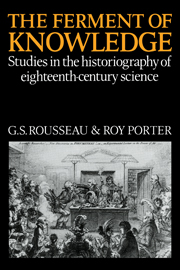7 - The terraqueous globe
Published online by Cambridge University Press: 03 May 2010
Summary
The globe as subject
With few exceptions, historians of science have paid little attention to a major branch of natural philosophy in the eighteenth century: the science of the system of the earth and its products. Distinguished general surveys, such as those of Dampier, Singer, Hall, Gillispie and Taton, have no connected analysis of the sciences of the terraqueous globe. The volume Natural Philosophy through the Eighteenth Century barely mentions the physical environment. Most historians of science are still writing (sometimes Whiggish) ‘tunnel histories’, tracing the progress of modern scientific disciplines, rather than exploring the cognitive landscapes of the past. And much scholarship in this field remains stubbornly biographical rather than problem-oriented.
Why has there been this neglect of the sciences of the physical environment, of the earth as such? It is partly a reflection of the focusing down of science itself, where formerly dominant all-embracing frameworks, like the Great Chain of Being, have splintered into specialties like palaeobotany and seismology. It is partly also a response to persuasive philosophies of science. Ever since the influential classifications of natural knowledge by Comte, J. S. Mill and Jevons, leading philosophers have argued that the ideal science is one of universal categories, amenable to abstraction and quantification. Thus physics rather than the ‘extensive’ environmental sciences becomes their model.
- Type
- Chapter
- Information
- The Ferment of KnowledgeStudies in the Historiography of Eighteenth-Century Science, pp. 285 - 324Publisher: Cambridge University PressPrint publication year: 1980
- 27
- Cited by

